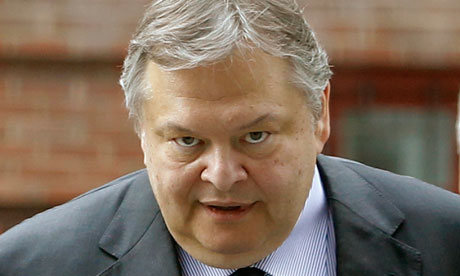Greek officials begin appointing advisers for fire-sale of state assets intended to raise €50bn by 2015
Helena Smith in Athens guardian.co.uk, Monday 1 August 2011 18.50 BST
Evangelos Venizelos, the Greek finance minister, said he aimed to raise €1.7bn by the end of September. Photograph: Jason Reed/Reuters
The starting gun for one of the biggest fire-sales in western history was fired as Greek officials began appointing advisers for the country's ambitious privatisation drive.
"Our target is clear, and it is to generate €1.7bn from privatisations by the end of September and €5bn by the end of the year," said the finance minister, Evangelos Venizelos.
After securing a second aid package to prop up an economy now dependent on international handouts to pay public wages and pensions, Athens has moved with record speed to divest itself of state assets ranging from prime real estate to loss-making companies.
By any measure it is a gargantuan task. At stake is Greece's €350bn debt, which before the EU and IMF agreed to bailout the country again was predicted to peak at 172% of GDP next year.
The socialist government says it aims to raise €50bn through the campaign by 2015. Enough, it is hoped, to not only make a dent in the debt but send a convincing message to the markets that have pummelled Athens since the onset of the crisis 18 months ago.
The prime minister, George Papandreou, has cancelled his summer holidays to accelerate the dismantling of a sector that his father Andreas – Greece's fiery socialist premier in the 1980s – did much to foster.
International lenders have warned that if there no progress with privatisations they will withhold the next tranche of aid in September.
"In more ways than one Papandreou is paying for the sins of his father," said Nikos Dimou, author of the bestselling book The Misfortune of Being Greek. "It was Andreas, after all, who did more than anyone else to run Greece into debt."
The appearance of For Sale and For Rent signs on everything from former Olympic venues to island locales, casinos, marinas and airports, has been met with unexpected acceptance by Greeks long weaned on state largesse. A growing majority appears to agree it is the only way of arresting soaring unemployment by attracting foreign investment. Experts estimate Athens could own around €300bn worth of state property, almost as much as the total Greek debt.
"There has definitely been a shift in mood," said Stefanos Manos, a former national economy minister in a centre-right government. "But that could easily change. It is very clear that the government is only doing this under great duress from [our] international creditors," he said.
"With timetables being so pressing, I worry that the whole process is very ill-prepared. If it there is not enough transparency we may end up like Russia, where only a cast of oligarchs end up benefiting."
With the privatisation drive now seen as crucial to reviving economic growth, the government has actively courted countries with big sovereign wealth funds to invest in Greece.
Last week Europe's paymaster, Germany, signalled it was interested in snapping up assets in the energy and tourism sectors.
At home tycoons who control large sectors of the media have also started jockeying for position in what one commentator called the "beginning of a civil war" to buy stakes in state companies.
"It is going to be a minefield for the government," said political analyst Giorgos Kyrtsos. "The troika [of lenders] are not well-versed in Greek reality. The programme is overly ambitious."
After years of resisting privatisations, the breakneck speed at which Athens has agreed to conduct the sales – nearly one every 15 days – has raised fears that state jewels will be sold at rock-bottom prices.
"In a buyer's market our biggest concern is that this entire process will only serve to benefit the forces of capitalism and do nothing to create development," said Yiannis Panagopoulos, president of the Confederation of Greek Workers, the country's biggest labour grouping.
"We will strongly oppose the sale of any sector in which the government has a strategic interest … there will be huge resistance if it tries to sell the electricity company, the water board, our post office or ports, sectors that are vital to developing this country."
Greece begins €50bn privatisation drive | World news | The Guardian
![The [Greek] European Tragedy](https://blogger.googleusercontent.com/img/b/R29vZ2xl/AVvXsEiWKI5s90SFm1wWTk6bs4p7CgslaC2SnYPsrZhb-B-smOufNNCSxCvpBLI9hOB-LsXZjir_PNmEiMk2-E62F3xkg96IoC6QFAaZAnPRTVH340IN9WBRmWJqPkjWlgyRj3zpALp7h6hvA58/s920/GkBack_new.jpg)
